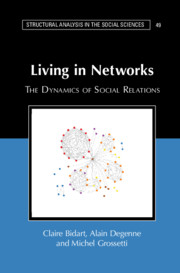Book contents
- Living in Networks
- Structural Analysis in the Social Sciences
- Living in Networks
- Copyright page
- Contents
- Figures
- Tables
- Preface
- Acknowledgments
- Introduction
- Part I Foundations of a Sociology of Relational Dynamics
- Part II Networks and Their Dynamics
- Part III Networks and Social Worlds
- 8 Networks Have a Spatial Dimension
- 9 Soft Segregation
- 10 Relationships and Networks As Resources
- 11 Unequal Networks
- 12 Networks Online and Offline
- Conclusion
- References
- Index
- Structural Analysis in the Social Sciences
12 - Networks Online and Offline
from Part III - Networks and Social Worlds
Published online by Cambridge University Press: 27 October 2020
- Living in Networks
- Structural Analysis in the Social Sciences
- Living in Networks
- Copyright page
- Contents
- Figures
- Tables
- Preface
- Acknowledgments
- Introduction
- Part I Foundations of a Sociology of Relational Dynamics
- Part II Networks and Their Dynamics
- Part III Networks and Social Worlds
- 8 Networks Have a Spatial Dimension
- 9 Soft Segregation
- 10 Relationships and Networks As Resources
- 11 Unequal Networks
- 12 Networks Online and Offline
- Conclusion
- References
- Index
- Structural Analysis in the Social Sciences
Summary
At the beginning of the 1990s, the Internet was starting to become fairly widely used in academic circles. This development raised questions within the community of social science researchers who were studying social networks. Among them was of course that of the changes in relational flows and structures (connectivity, size, density, and composition of personal networks, etc.) that might occur as a result of the increasing diversification and sophistication of communication technologies. For this chapter, we draw on two recent original surveys in addition to the two on which our analyses have so far been based. The first is a questionnaire-based survey conducted in January and February 2014 among 2,700 young people aged between 15 and 25 living in the Toulouse area. The second survey is a detailed questionnaire filled in during face-to-face interviews by some 470 individuals aged 60 and over (the oldest was 100 at the time of the survey) in the Toulouse area. The changes seem to be tending in the direction of a slight reduction in strong ties, an increase in weak or even very weak ties and a strengthening of relational inequalities and homophily.
- Type
- Chapter
- Information
- Living in NetworksThe Dynamics of Social Relations, pp. 281 - 300Publisher: Cambridge University PressPrint publication year: 2020

